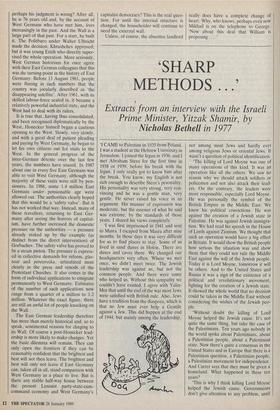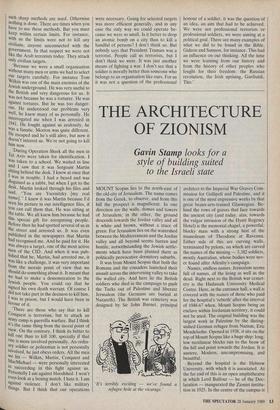'SHARP METHODS ...'
Extracts from an interview with the Israeli Prime Minister, Yitzak Shamir, by
Nicholas Bethell in 1977 `I CAME to Palestine in 1935 from Poland. I was a student at the Hebrew University in Jerusalem. I joined the Irgun in 1936, and I met Abraham Stern for the first time in 1938 or 1939, before his break with the Irgun. I only really got to know him after the break. You know, my English is not rich enough to describe Stern's pesonality. His personality was very strong, very con- vincing and he was a gentle man, very gentle. He never raised his voice in an argument. His manner of expression was moderate, but the essence of what he said was extreme, by the standards of those years. I shared his views completely.
`I was first imprisoned in 1941 and sent to Masra. I escaped from Masra after nine months. In those days it was very difficult for us to find places to stay. Some of us lived in sand dunes in Holon. There are dunes and caves there. We changed our headquarters very often. Where we met once, we didn't meet twice. The Jewish leadership was against us, but not the common people. And there were some who helped us. Without this sympathy we couldn't have existed. I agree with Yalin- Mor that until the end of the war most Jews were satisfied with British rule. Also, Jews have a tradition from the diaspora, which is that no Jew must ever help a Gentile against a Jew. This did happen at the end of 1944, but mainly among the leadership, not among most Jews and hardly ever among religious Jews or oriental Jews. It wasn't a question of political identification. ' The killing of Lord Moyne was one of many operations of this kind. It was an operation like all the others. We saw no reason why we should attack soldiers or policemen and not also attack their lead- ers. On the contrary, the leaders were more responsible, especially Lord Moyne. He was personally the symbol of the British Empire in the Middle East. We knew his political convictions. He was against the creation of a Jewish state in Palestine. He was against Jewish immigra- tion. We had read his speech in the House of Lords against Zionism. We thought that such an operation would have a big effect in Britain. It would show the British people how serious the situation was and show them that they could not rule the Middle East against the will of the Jewish people. Today it is Lord Moyne, tomorrow it will be others. And to the United States and Russia it was a sign of the existence of a political and revolutionary movement, fighting for the creation of a Jewish state. It showed the whole world that no decision could be taken in the Middle East without considering the wishes of the Jewish peo- ple.
`Without doubt the killing of Lord Moyne helped the Jewish cause. It's not quite the same thing, but take the case of the Palestinians. Ten years ago nobody in the world spoke about Palestinians, about a Palestinian people, about a Palestinian state. Now there's quite a consensus in the United States and in Europe that there is a Palestinian question, a Palestinian people, a Palestinian movement for independence. And Carter says that they must be given a homeland. What happened in these ten years?
`This is why I think killing Lord Moyne helped the Jewish cause. Governments don't give attention to any problem, until such sharp methods are used. Otherwise nothing is done. There are times when you have to use these methods. But you must keep within certain limits. For instance, with us the limits were not to kill any civilians, anyone unconnected with the government. In that respect we were not like the Arab terrorists today. They attack only civilian targets.
'Because we were a small organisation without many men or arms we had to select our targets carefully. For instance Tom Wilkin was one of the main enemies of the Jewish underground. He was very useful to the British and very dangerous for us. It was not because he was a torturer. He was against tortures. But he was too danger- ous. He understood our problems very well, he knew many of us personally. He interrogated me when I was arrested in 1941. He fought against us zealously, he was a fanatic. Morton was quite different. He escaped and he's still alive, but now it doesn't-interest us. We're not going to kill him now.
'During Operation Shark all the men in Tel Aviv were taken for identification. I was taken to a school. We waited in line and I saw that it was Sergeant Martin sitting behind the desk. I knew at once that
was in trouble. I had a beard and was disguised as a rabbi, but when I got to the desk, Martin looked through his files and said, "You are Ysernitzky [my real name]." I knew it was Martin because I'd seen his picture in our intelligence files, if You can call them that. He was sitting at the table. We all knew him because he had this special gift for recognising people. Before then he had spotted several of us in the street and arrested us. It was even published in the newspapers that Martin had recognised me. And he paid for it. He was always a target, one of the most active men of the CID. And when it was pub- lished that he, Martin, had arrested me, it was like a challenge, it was very important from the morale point of view that we should do something about it. It meant that We had to make a demonstration to the Jewish people. You could say that he signed his own death warrant. Of course I did not take part in the decision to kill him, 1 was in prison, but I would have been in favour of it.
`There are those who say that to kill Conquest is terrorism, but to attack an army camp is guerrilla warfare. But I think its the same thing from the moral point of view. On the contrary, I think its better to kill one than to kill 100, specially if that one is more involved personally. An ordin- ary soldier or policeman is not personally Involved, he just obeys orders. All the men we hit — Wilkin, Martin, Conquest and MacMichael — were personally interested in succeeding in this fight against us. Personally I am against bloodshed. I won't even look at a boxing match. I hate it. I am against violence. I don't like military things. But I think that our operations were necessary. Going for selected targets was more efficient generally, and in any case the only way we could operate be- cause we were so small. Is it better to drop an atomic bomb on a city than to kill a handful of persons? I don't think so. But nobody says that President Truman was a terrorist. People call us terrorists, but I don't think we were. It was just another means of fighting a war. I don't see that a soldier is morally better than someone who belongs to an organisation like ours. For us it was not a question of the professional honour of a soldier, it was the question of an idea, an aim that had to be achieved. We were not professional terrorists or professional soldiers, we were aiming at a political goal. There are many examples of what we did to be found in the Bible, Gideon and Samson, for instance. This had an influence on our thinking. All the time we were learning from our history and from the history of other peoples who fought for their freedom: the Russian revolution, the Irish uprising, Garibaldi, Tito.'


















































 Previous page
Previous page